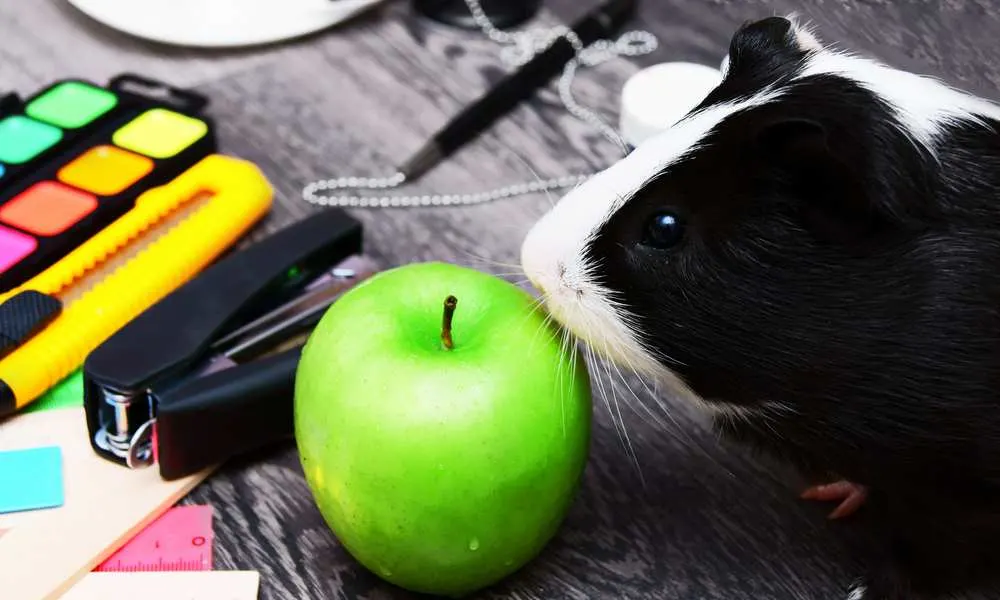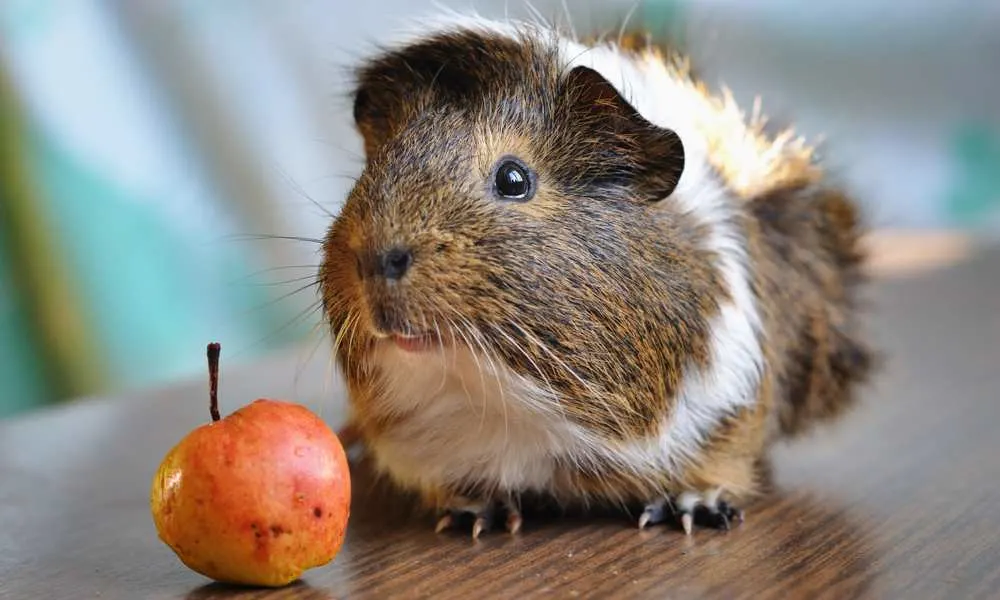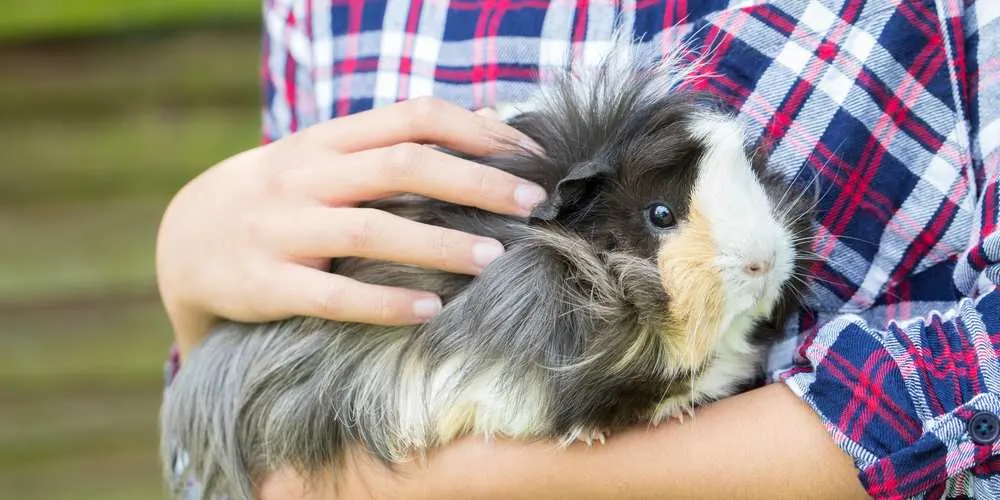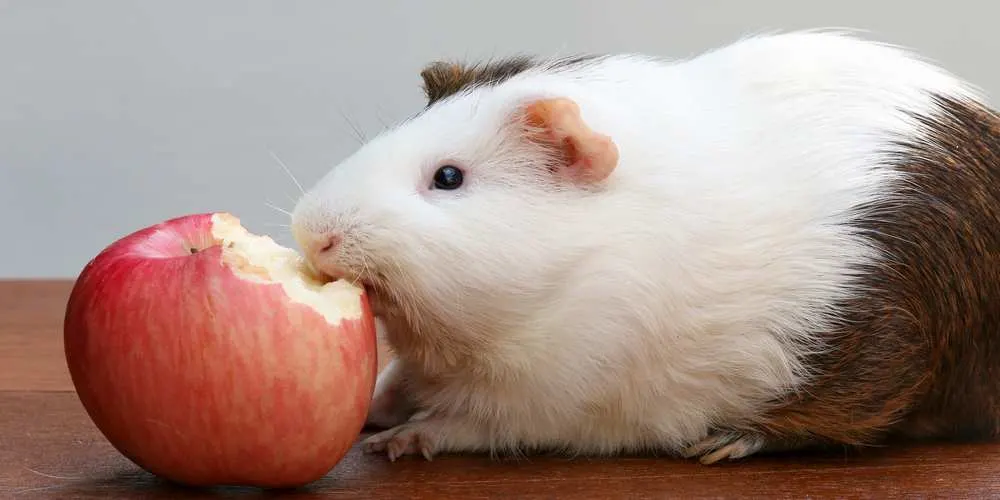The famous saying reads: “An apple a day keeps the doctor away!”. As you know, apples have a lot of health benefits for us. They’re nutritious, sweet, and above all – yummy! This well-known fruit is packed with vitamins and fiber.
Whether it’s green or red – it’s always a pleasure to have one!
However, does that exact phrase apply to our furry little friends? Can guinea pigs eat apples?
Well, the good news is, they absolutely can! But, as a responsible cavy owner, you’re probably eager to find out how much is too much or can guinea pigs eat apple peels and cores!
No worries, you’re on the right track. In this article, we’re covering all of your burning questions. Besides the main concerns, you’re even going to get a few more tips for a healthy, balanced diet for your cavy. Read along!

Can Guinea Pigs Eat Apples?
Apples can be a good way to spice up your piggies’ meals. However, just like with every other fruit – apples should only be used as a treat!
For cavies to have a long and healthy life, their diet must consist primarily of high-quality guinea pig hay. Hay should always be available to your furry pet. It is not only that hay is an essential part of their diet; cavies also use it to grind their constantly growing teeth.
As much as hay is essential, guinea pigs do need fruits and vegetables in their diet. Because cavies naturally suffer from vitamin deficiency, they need an external source to be healthy.
These fluffy herbivores usually love apples! A balanced diet is vital for cavies because of their sensitive digestive system. Besides that, apples are filled with sugar, which is terrible news for their digestion. Also, sugar can cause severe health problems.
Veggies and fruits are an excellent way for guinea pigs to ingest needed vitamins. Just like with all good things in life – moderation is crucial. As mentioned above, fruits are considered a treat for your piggie, so apples shouldn’t take more than 10 percent of its diet.
Nutritional Value
Having all of the above information in mind, it’s good to look at the nutritional value of one apple. Here’s the nutritional table for 100 grams of raw, unpeeled apples.
| Calories | 52 |
| Water | 86% |
| Protein | 0.3 grams |
| Carbs | 13.8 grams |
| Sugar | 10.4 grams |
| Fiber | 2.4 grams |
| Fat | 0.2 grams |
As you can see, apples mainly consist of water and carbs. Because of their low-calorie count, they can be suitable for obesity predisposed pets, such as your piggie. This crunchy fruit is rich in fibers but also has a large amount of sugar.
As for vitamins, apples have loads of ’em! This fruit is primarily known for being a great source of Vitamin C and Potassium! But, more on that later.
Since we showed the nutritional value of unpeeled apples, that brings up the question:
Can Guinea Pigs Eat Apple Skins?
Most certainly, they can! Some piggies enjoy the skins more than the apple fruit by itself. So if your guinea pig isn’t crazy for apples, try giving them some fresh apple skins instead.
Additionally, apple peels can even be a healthier option for your cavy! The skins contain less sugar than the fruit. By giving piggies apple skins, in a way, you’re getting rid of one of the leading apple drawbacks. Also, the chewy texture of the peels helps guinea pigs grind their teeth!
However, if you are giving your piggie peels from store-bought apples, you should watch out. Apples that are grown commercially are usually sprayed with pesticides and other chemicals. Besides those chemicals, some apples are coated with wax.
Keep in mind, it’s crucial to thoroughly wash store-bought apples. Before serving, wash the apples with warm water. In such a way, you’re rinsing away any wax or chemicals that may be on the skin.
Does Color Matter?
With more than 7,500 varieties, it’s safe to say that there’s a bunch of apple types! We humans usually distinguish them by color. The red and yellow ones are typically sweet, and the green ones are sour. So, what’s the best option for guinea pigs? Does color even matter?
Unfortunately, not all apples are suited for cavy consumption. Apples that are sour or unripe are not an excellent option for your pocket friend. As you know, those apples are usually green. Besides the acidic green apples, skip on the brownish-rotten ones as well!
Apples with a sour taste contain more acids. Besides being uncomfortable for them, it can even cause mouth irritation in guinea pigs. When choosing an apple for your piggie, instead of a Granny Smith, go for a Red Delicious one!

Health Benefits
Now that you know the basics of apple consumption in guinea pigs, it’s safe to talk about the benefits! As to humans, apples can be very beneficial to our furry pets. For starters, they have loads of antioxidants and are considered “dietary powerhouses.”
Antioxidants
These bright-colored fruits contain a range of antioxidants. Some of them include quercetin, phloridzin, catechin, and chlorogenic acid. Some studies show that more antioxidant activity is higher in the peel than in the apple flesh.
Antioxidants protect cells from free radicals. This is why these substances are excellent in preventing cancer, heart disease, and even degenerative illnesses.
Vitamin C
As mentioned before, guinea pigs naturally have a vitamin deficiency. Specifically, they lack vitamin C. Cavies body just isn’t capable of naturally storing or producing this vitamin. This is why guinea pigs are prone to a disease called scurvy.
Apples are a great source of vitamin C! Cavies need around 30 milligrams of this vitamin daily. Apples can be a great way for your pet to have an enjoyable snack and prevent a serious illness!
Dietary Fiber
Fiber is very present in the apple fruit, but even more in the peels! Cavies, by their nature, need a high-fiber diet. Fiber is important for the stimulation of gastrointestinal motility. Furthermore, fiber ensures a balanced bacterial flora in the gut!
Keep in mind, the primary source of fiber in guinea pigs should still be hay!

Health Risks
It’s safe to say that apples give more benefits than harm to your guinea pig. Generally, apples are a safe and healthy fruit. However, you need to know a few potential risks before feeding apples to your piggie.
Cyanide Poisoning
As you probably noticed, there’s one part of an apple that we have yet to cover – the core!
So, can guinea pigs eat apple cores? There’s a good reason why we waited until now! While the cores by themselves are safe, apple seeds are problematic.
The seeds contain a substance that releases cyanide when chewed, which is poisonous. Apple seeds don’t have enough cyanide to hurt a human, but they can harm your small pocket friend! When feeding your guinea pig with apple cores, make sure to take out the seeds.
Diabetes
Although apples provide loads of health benefits, the sugar content is too high, especially for small animals such as guinea pigs. If cavies consume too much sugar, there’s a risk they’re going to develop diabetes.
On the bright side, diabetes is not common in guinea pigs. Unlike with other animals, the disease can be temporary and usually doesn’t require insulin therapy. To prevent or treat diabetes in cavies, a low-fat, high-fiber diet is crucial.
Additional Warnings
When serving apples to your piggie, make sure that you chopped it up. Never give your piggie a whole apple!
Besides being a choking hazard, one whole apple is too much for a guinea pig to consume at one sitting. If a guinea pig eats too much apple at once, diarrhea can occur.
As we mentioned before, cavies have a sensitive digestive tract. Diarrhea can occur if your guinea pig has an imbalanced diet. Loose stools can lead to dehydration and can even be fatal in some cases. This is why you shouldn’t be very generous with fruits in your piggies diet.

Final Words
Now you know! Apples are out of harm’s way for your guinea pig. Not only are apples safe, but the peels and cores are just as good! Just remember to remove the seeds.
The seeds can be very dangerous for piggies because of the cyanide, so remember to get rid of them before giving apples to your chubby pal.
Apples can be an excellent addition to your guinea pigs’ diet. If their diet mainly consists of hay, apples can be an enjoyable desert. With all the fibers and vitamins in them, your pet will undoubtedly be a healthy and happy little furball.
Of course, remember that moderation is key! When anything is given in excess, the benefits get canceled out, and your pal can end up at the vet.
See Also: Can Guinea Pigs Eat Applesauce?

